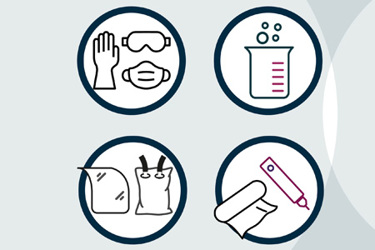How To Handle Single-Use Technology Biopharma Waste Through Data Sharing And Collaboration
By Nicola Coles, Phorum Director

Alongside traditional stainless-steel facilities, we see increasing use of single-use technologies (SUTs), which use high-quality plastic systems with numerous complex, interconnected components in the production of biopharmaceuticals.
There are many benefits to this change, e.g. possibly lower production costs and accelerated time-to-market, but the growing use of SUTs also results in an increased amount of plastic waste. The complex nature of this waste also poses challenges for recycling.
However, the high-value plastics used in SUTs and the resultant quality of the waste material can offer opportunities. These include innovative solutions that may embed circularity in the design of products, enhanced recycling capabilities, and reduced reliance on virgin material extraction.
To explore this complex scenario, BioPhorum has published Estimating the volume of single-use waste produced during drug substance manufacturing of monoclonal antibodies, which has a particular emphasis on the plastic waste generated.
“It is important for industry to be able to say how many materials are used and consumed in the production of waste,” said Caroline Calmels, Sustainability Market Manager at Saint-Gobain. “Indeed, it is important for industry to be involved in this task to better quantify the volume it represents and to categorize these types of waste. It is useful for the biopharmaceutical sector, as other industries have already done, to carry out this first step and to know the elements that have the greatest impact so that we can take responsibility and meet the next appropriate challenges to reduce the impact.”
The first part of the paper considers the case for data sharing and collaboration to enable a better environmental impact of SUTs. It looks at SUT usage and some of the challenges faced when seeking to quantify manufacturing waste material at scale.
The second part provides baseline data that quantifies the single-use plastic waste generated when manufacturing monoclonal antibodies, focusing on batch-level as well as global-level outputs. It incorporates details about the weights of the items used and a variety of process variables.
Various stakeholders – including ESG/SHE leads, waste management specialists, and SUT product designers – can use the data to support decision-making and improve waste management practices.
“Achieving sustainability improvements requires solid data and teamwork,” said Magali Barbaroux, Corporate Research Fellow at Sartorius. “For plastic circularity, the initial step is defining ‘what’ and ‘how much’. Lacking existing data, we collaborated to create a model using assumptions and real data, establishing a transparent, open baseline for future development.”
The publication concludes with suggestions for the next steps, which include expanding the data to include other biologics production processes and exploring multi-organizational collaboration for recycling.
In response to the escalating global focus on plastic use and end-of-life management, BioPhorum members are taking on the challenge to work collaboratively towards a more environmentally sustainable future for the production of biopharmaceuticals.
To get involved and for more information, download the paper, and contact Nicola Coles, Phorum Director at nicola.coles@biophorum.com.
Get unlimited access to:
Enter your credentials below to log in. Not yet a member of Bioprocess Online? Subscribe today.
